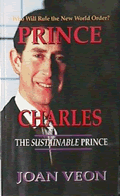Related
Articles:
Global Taxes Looming, Watch Your Wallet
Other
Veon
Articles:
US Leaders Highlight World Economic Forum Agenda
Global Taxation And Tax Harmonization
Does The
Global Economy Need a Global Currency?
WITHOUT AFRICA'S POVERTY, GLOBAL TAXATION IS NOT POSSIBLE
By
Joan Veon
July 30, 2005
NewsWithViews.com
The focus for the last seven years, since the last G8 in England, has been aid for Africa. In 1998, the churches organized the Jubilee Debt Relief Campaign. The terminology used was to remind world leaders of the Biblical Year of Jubilee recorded in the Old Testament where the debts of debtors were forgiven. I remember going to one of the non-governmental organizations-NGO�s workshop on global tax. There I interviewed a key leader who told me that with the huge flows possible that it would be more than enough for the UN and Africa!
Then in 2000, the United Nations held the Millennium Summit in which they set forth their goals for the 3rd Millennium. These goals will cost the world $50B a year which will escalate to $126B by 2015 when the UN is suppose to have reduced poverty, hunger and HIV/AIDS by 50%, and provide basic education and clean drinking water to the whole world. Seven years later, both debt forgiveness and the concept of global taxation have come full circle. This is it. This is where the rubber meets the road.
Over the last ten years, the idea of global taxation has gone through a number of revisions. Last year, French President Jacques Chirac put the idea of global tax on the leader�s agenda. At that time he proposed a �tax for the poor� and said he would make concrete proposals after a major study was completed. This year he has called his international tax scheme an �International Solidarity Levy.� The levy would be a tax on airline tickets. Countries in favor include Brazil, China, and Germany. This would be easy to set up as there are no international treaties which prohibit the creation of a flat tax on airline tickets since a number of airlines already have various types of taxes on airline tickets for airport renovation and the like. The rate would be personalized according to the level of a country�s willingness with airlines collecting the revenues and passing them on to the respective government to supplement their foreign aid funds.
So why has Africa perpetually poor? There are a number of reasons, but we can go back to World Bank loans that were forced on a number of African countries during the 1970s. Under World Bank President Robert McNamara, who served as president from 1969 to 1981, World Bank economists forced their way into African countries in order to come up with a financial plan for their development. Their plans were so secret that not even the president of that country was privy to what the plan called for. He was pressured into taking huge World Bank loans to carry out these grandiose projects which were suppose to bring the country enough income to repay the loans. Unfortunately most of these projects became �White Elephant� projects, leaving these countries with huge indebtness. These are the Highly Indebted Poor Countries which you and I are being asked to bail out with increased foreign aid, debt forgiveness, and/or international taxation.
So how much does Africa owe the World Bank and the International Monetary Fund? According to John Hilary from War on Want, about $532B is owed by the 60 Highly Indebted Poor Countries. Currently only 18 countries have qualified for debt forgiveness as a result of meeting World Bank conditions. The amount of debt forgiveness is $40B but the debt servicing of the remaining $492B owed is $45B a year. Hence the reason for global tax.
The World Bank requires countries to take specific steps in order to qualify for debt forgiveness which include: changing their structure of government to be �more accountable�, make all financial figures public, privatize their energy sector, water, electricity, etc. and set up regional government structures.
At every turn, it is public-private partnership, the selling off of government owned resources, or privatizing through partnering with business. This is seen in President Clinton�s New Partnership for African Development-NEPAD. President Bush has set up his own initiative, the Millennium Challenge Corporation-MCC, a U.S. government corporation, to administer funds. An informational brochure handed out at the G8 described it as �an innovative new foreign assistance program designed to eliminate extreme poverty and promote sustainable economic growth.� The purpose of which is to set up public-private partnerships where governments end up transferring assets into this new partnership to be run by the corporations. As expected, there are steps that countries need to take in order to be eligible, just like the World Bank qualifications. For example, the MCC Board approved a Compact with Cape Verde for approximately $110M. The Compact will support their efforts in achieving its overall national development goal of transforming its economy from aid-dependence to sustainable, private-sector led growth.�
In addition, at the 2002 UN World Summit on Sustainable Development, an international public-private partnership was announced which included eight African countries, six of the G8 countries, the American Forest and Paper Association, and four major environmental organizations including World Wildlife Federation, set up the Congo Basin Forest Partnership which involves moving 74 million acres of land in Africa! In an interview by colleague Joan Peros, a key U.S. State Department official refused to comment on any debt-for-nature swaps!
In early June I was at a reception for the President of Ghana. He made it very clear that Ghana is open to corporations and anyone who wants to invest in his country through �partnering.� Even the Prince of Wales International Business Leaders Forum has called for public-private partnership.
The question that should be asked is �What will these countries have left once they privatize their state owned assets and change their form of government to meet a global structure of government? In an interview with an African official from an African consumers group, he voiced the same concerns. His organization has made it very clear to G8 leaders that they do not want any more aid with strings and privatizations.
|
Subscribe to the NewsWithViews Daily News Alerts! |
In
conclusion, it is not only the assets of Africa which are at stake,
but the whole transfer of wealth through our tax-dollars to support
the perpetual �war on poverty.� In an interview with French President
Jacques Chirac, I asked if the proposed �International Solidarity
Levy� is going to be duplicated once it is in place. He told me there
are many different proposals for global tax. I would assume that if
the airline tax is successful and has little opposition, �Pandora�s
Box� will open to a countless number of other taxes. Without Africa,
global taxation would not be possible.
� 2005 Joan Veon - All Rights Reserved
Sign Up For Free E-Mail Alerts
E-Mails
are used strictly for NWVs alerts, not for sale
 Order
Joan Veon's book;
Order
Joan Veon's book;
"The
United Nations'
Global Straitjacket"
Joan Veon is a businesswoman and international reporter, having covered 64 Global meetings around the world in the last ten years. Please visit her website: www.womensgroup.org. To get a copy of her WTO report, send $10.00 to The Women's International Media Group, Inc. P. O. Box 77, Middletown, MD 21769. For an information packet, please call 301-371-0541
E-Mail: jveon@adelphia.net
At every turn, it is public-private partnership, the selling off of government
owned resources, or privatizing through partnering with business.











